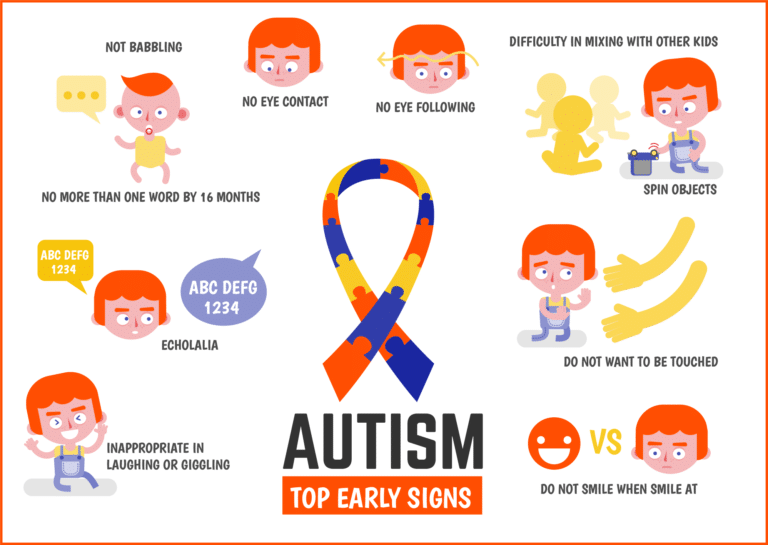Spotting the signs of autism in children can be challenging, but an early diagnosis can make all the difference in their learning and development. If you’re a parent or caregiver, or someone interested in a career working with children, understanding the early signs of autism can be a huge benefit to a child’s health, well-being and personal growth.
In this guide, we’re showing you the early signs of autism in children, with a detailed overview of the behaviours to watch out for. We also take a look at the qualifications you’ll need to work with children with autism or other special care needs, so you can take the first step towards what promises to be a rewarding career.
What is Autism?
Autism spectrum disorder (ASD) is a complex developmental disability which affects a person’s ability to interact and communicate with others. Autism is not an illness or disease and cannot be ‘cured’. There are, however, a variety of techniques and strategies that can help people to live with the condition.
People with autism experience the world differently to others. This can make some situations challenging, so early diagnosis is important to make sure people get the help and support they need.
It’s estimated that around 700,000 people in the UK have been diagnosed with autism. However, because it’s a spectrum disorder, it’s thought that many thousands more people live with the condition without knowing it. People from all backgrounds can be autistic, although it appears to affect men more than women.

Early Signs of Autism in Children
Although autism is difficult to diagnose before 24 months, the first symptoms often arise between 12 and 18 months. The early signs of autism in children involve the absence of ‘normal’ behaviours, rather than the presence of abnormal ones.
This makes symptoms quite hard to spot. In some cases, the earliest symptoms can even be misinterpreted as signs of a “good baby,” since the toddler may seem quiet, independent, and undemanding. However, you can catch warning signs early if you know what to look for.
We'll take an in-depth look at the early signs of autism in children below so that parents, early years practitioners and other caregivers are aware of the common signs to look for.

- Not babbling – Babbling refers to the sounds that babies make before they begin to talk, such as vowel and consonant combinations like ba, da, and gee. Twelve-month-olds should look at someone while they babble, and take turns babbling with caregivers (like a back-and-forth babbling “conversation”).
- No more than one word by 16 months – A lack of vocabulary at 16 months is a tell-tale sign of autism, especially if the infant has only said one word.
- Poor eye contact – Not looking at caregivers when communicating or playing with them.
- No eye following – This could be as simple as not following an object or not looking in the direction of a caregiver’s finger when he or she points to something. A typical 12-month-old will look when someone points to a toy on a shelf, for example.
- Difficulty in mixing with others – If a child does not seek out interaction with others, or rarely smiles or laughs when playing with a caregiver, this is an indicator of autism.

- Spinning objects or other repetitive actions – Some developing babies do repetitive actions once in a while, but babies with autism demonstrate these actions more often. For example, spinning a car wheel over and over again, rather than playing with the toy appropriately. Another example would be a child flapping his hands repetitively.
- Not smiling when smiled at – A natural reaction for a developing child is to imitate actions like clapping hands, smiling, or people’s speech sounds. One of the early signs of autism in children is not responding to a caregiver’s expression in the appropriate way, e.g., smiling when smiled at or talked to.
- Inappropriate laughing or giggling – Autistic people struggle with “proper” behaviour and some children with autism have a difficult time distinguishing if they can laugh. Such clues are too subtle for them, which leads to them laughing no matter what situation they’re in.
- Echolalia – A symptom of some children with ASD is the struggle to produce spontaneous speech. Studies have shown that in some cases echolalia (repeating words or phrases said by another person) is used as a coping mechanism, allowing a person with autism to contribute to a conversation when unable to produce spontaneous speech.
- Do not want to be touched – Another one of the early signs of autism in children is physical contact, or moreover the lack of wanting it. Children with autism may pull away from being touched, hugged or having their hand held.
Which Qualifications Do You Need to Work with Autism?

If you think you might like to specialise in this area, then it’s a fantastic idea to pursue a recognised, accredited qualification such as our NCFE CACHE Certificate in Understanding Autism, or the Certificate in Understanding Specific Learning Difficulties.
Both of these courses will give you a solid foundation of knowledge when it comes to helping people with autism to thrive and reach their full potential. They’re incredibly useful for numerous professional fields such as childcare, nursing, or health and social care.
Summary
If you’re a parent or caregiver to a child with autism, our Understanding Autism course will prove very helpful; you’ll learn effective communication strategies, how to help children identify and manage their emotions, as well as discover the many positive (and often overlooked) aspects of living with the condition.
We hope this guide proves useful to parents, caregivers, and those looking for a career working with children with specific care needs. If you’re interested in learning more about our range of distance learning courses, visit the Oxbridge homepage or call us on 0121 630 3000 to speak to one of our experienced course advisers.
